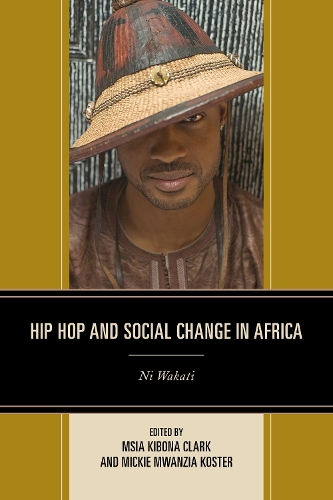
Hip Hop and Social Change in Africa: Ni Wakati
(Hardback)
Available Formats
Publishing Details
Hip Hop and Social Change in Africa: Ni Wakati
By (Author) Msia Kibona Clark
Edited by Mickie Mwanzia Koster
Contributions by Shaheen Ariefdien
Contributions by Asligul Berktay
Contributions by Klara Boyer-Rossol
Contributions by Rico Chapman
Contributions by Msia Kibona Clark
Contributions by Katharina Greven
Contributions by John Idriss Lahai
Contributions by Sheba Lo
Bloomsbury Publishing PLC
Lexington Books
30th October 2014
United States
Classifications
Professional and Scholarly
Non Fiction
Popular music
African history
Social and cultural anthropology
306.096
Physical Properties
Hardback
336
Width 160mm, Height 235mm, Spine 28mm
594g
Description
This book examines social change in Africa through the lens of hip hop music and culture. Artists engage their African communities in a variety of ways that confront established social structures, using coded language and symbols to inform, question, and challenge. Through lyrical expression, dance, and graffiti, hip hop is used to challenge social inequality and to push for social change. The study looks across Africa and explores how hip hop is being used in different places, spaces, and moments to foster change. In this edited work, authors from a wide range of fields, including history, sociology, African and African American studies, and political science explore the transformative impact that hip hop has had on African youth, who have in turn emerged to push for social change on the continent. The powerful moment in which those that want change decide to consciously and collectively take a stand is rooted in an awareness that has much to do with time. Therefore, the book centers on African hip hop around the context of its time for change, Ni Wakati.
Reviews
In recent years, several books have been published concerning African hip-hop, including Eric Charrys Hip-hop Africa: New African Music in a Globalizing World (2012) and Mwenda Ntarangwis East African Hip-hop: Youth Culture and Globalization. While these books tackle some aspects of the societal implications of the music genre, they tend to focus on globalization, youth culture, or the music alone. The work under review is sharply focused on a critical examination of hip-hop and social change, whether by political and social commentary or by actually changing traditions and behavior. Furthermore, the book is unique in that it blends essays written by scholars as well as by some African hip-hop artists themselves, which allows for an exploration of the topic from both academic and firsthand perspectives. . . .The essays are thoughtful, insightful, and well written. All academic libraries with substantive African studies and/or world music collections. Summing Up: Highly recommended. All levels/libraries. * CHOICE *
This story of hip-hop in Africa, as heard from the voices of artists, activists and academics, is a crucially important work on the history and politics of the African contribution to the global hip hop movement. Instead of acting as passive observers to or victims of government corruption, poverty, police brutality, gender discrimination, and exploitation by the hands of multinational corporations, African hip hop artists are acting as rebel agents of change in their local communities. By calling into question the triumph of neo-liberal economic policies, Hip Hop and Social Change in Africa has given us an insightful and comprehensive analysis on how hip hop speaks truth to power and oppression. -- Seth Markle, Trinity College
Hip Hop and Social Change in Africa: Ni Wakati positively broadens our understanding of hip hop on the continent. It shows how hip hop in its spoken, written, and visual form has created outlets for Africans north-south and east-west to recognize, perceive, understand, and respond to the problems of the twenty-first century. In short, Clark and Koster bring together important contributions from scholars and artists that illustrate the pan-African force that is hip hop. -- P. Khalil Saucier, Rhode Island College
Author Bio
Msia Kibona Clark is assistant professor of Pan African studies at California State University. Mickie Mwanzia Koster is assistant professor of history at the University of Texas at Tyler.
